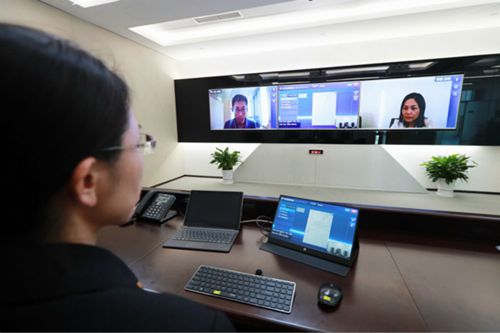New Beijing Internet Court accepts 207 lawsuit applications


A judicial official at the new Beijing Internet Court demonstrates on Sunday how cases are tried online. CHINA DAILY
Beijing Internet Court has accepted more than 200 applications of lawsuits, including one involving Douyin, a popular domestic short-video application, only a day after its establishment, according to a statement from the court on Monday.
The court was open and in operation at 10 am on Sunday. By 6 pm Monday, it had received 207 lawsuit applications and its website has been visited more than 200,000 times, it said.
Among the applications, one was made by the high-profile app Douyin. It claims one of its videos could be downloaded and broadcasted on another online platform, which damaged the video makers' online copyright, it said.
In its application, Douyin requested the court order the platform to stop the infringement and pay a 1 million yuan ($145,755) fine, it added.
Douyin's application and related materials were submitted to the court online, and the court replied on Monday that it has already filed this case.
As for the other applications the court received, it did not disclose whether they are filed or not.
In China, people can first apply for a lawsuit and provide materials to a court online, and if the supplied materials are sufficient enough and meet the standards of a case filing, the court will file immediately after the application.
The Beijing Internet Court is the second internet court in the country, aiming to address rising disputes and problems caused by the nation's ever-growing reliance on cyberspace.
The court sits in the capital's Fengtai district, mainly handling internet and intellectual property rights cases, including disputes involving online loans, online shopping contracts and online copyright issues.
The country's first internet court was set up in Hangzhou, East China's Zhejiang province, in August last year. So far, it has heard more than 11,000 internet-related cases.
The key feature of such internet courts is that litigants can deal with their lawsuits entirely online - they are not required to go to the courts in person at any point from the case filing to the hearing.
According to the central leadership's plan, another internet court will open in Guangzhou, South China's Guangdong province, by the end of this month.
MOST POPULAR
- 1 China to give visa-free treatment to another 9 countries
- 2 China fully opens manufacturing sector to foreign investors in landmark opening up move
- 3 China's import expo attracts record-breaking participating countries, exhibitors
- 4 China's door opening even wider to foreign visitors, businesses
- 5 China revises rules to ease foreign strategic investment in listed firms
Editors' Picks
 Video:
Peru sees new port open
Video:
Peru sees new port open
 Infographic:
China's public holidays for 2025
Infographic:
China's public holidays for 2025
 Infographic:
Basic facts of APEC
Infographic:
Basic facts of APEC
 Infographic:
Wrapping up the 7th CIIE: Data recap
Infographic:
Wrapping up the 7th CIIE: Data recap



